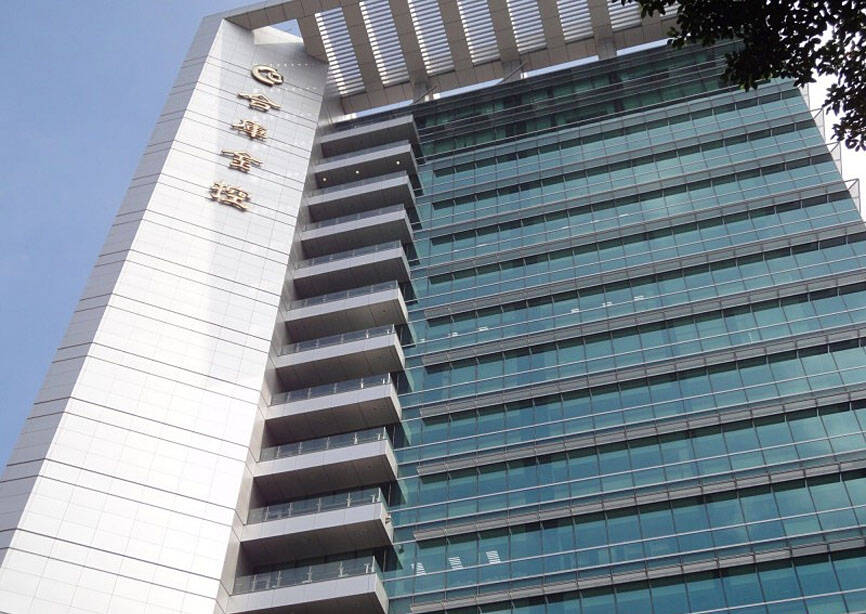State-run Taiwan Cooperative Financial Holding Co (合庫金控) yesterday said that it is looking at stable profit growth this year, as the improving economy at home and abroad would benefit core businesses and reverse loss-making overseas operations.
The bank-focused conglomerate gave the guidance during an online investors’ conference and said that economic scenes appear less murky, limiting the need for provisions.
Taiwan’s GDP growth this year is predicted to rise more than 3 percent, much faster than last year’s 1.32 percent.

Photo: Chen Mei-ying, Taipei Times
Net income last year totaled NT$17.88 billion (US$558.92 million), or earnings of NT$1.17 per share, company data showed.
The results represented declines of 14.12 percent and 15.22 percent from their levels in 2022, mainly due to provision costs for operations in Cambodia and elsewhere, Taiwan Cooperative Financial president Chen Mei-tsu (陳美足) said.
“Cambodia emerged from the pandemic in a slower-than-expected fashion,” prompting the lender to raise provision costs in the second and third quarters of last year to shore up its capital strength, officials said.
Things started to stabilize in the fourth quarter, when overseas operations squeezed a tiny profit, they said.
A string of rate hikes by the US Federal Reserve also pushed up funding costs more rapidly than the rise in interest income, officials added.
That explains why its main subsidiary, Taiwan Cooperative Bank (合作金庫銀行), last year saw its net income fall 14.95 percent to NT$16.3 billion, despite trading gains from financial products — including foreign exchange swaps — soaring nearly 200 percent.
Foreign exchange swaps generated more than NT$9 billion in profit, but might drop to NT$7.5 billion this year, they said.
This is due to Taiwan’s central bank last week unexpectedly raising interest rates by 0.125 percentage points and given that the US Federal Reserve might lower rates to support the US economy, officials added.
The narrowing difference between the interest rates of Taiwan and the US is unfavorable for swap revenue, officials said.
Even without the provision costs, Taiwan Cooperative Financial would record a net income increase of almost 20 percent, indicating that core businesses remain healthy, Chen said.
High funding costs also affected the results of Taiwan Cooperative Securities Co Ltd (合庫證券) and Taiwan Cooperative Bills Finance Corp (合庫票券), officials said.
In contrast, its venture capital and life insurance units saw robust improvement in their earnings ability, they added.
Taiwan Cooperative Financial said it plans to distribute a cash dividend of NT$0.65 per share and another stock dividend of NT$0.35 from last year’s net income, suggesting a payout ratio of 85 percent.
The plan is still pending approval from a shareholders’ meeting later this year.

TECH CLUSTER: The US company’s new office is in the Shalun Smart Green Energy Science City, a new AI industry base and cybersecurity hub in southern Taiwan US chip designer Advanced Micro Devices Inc (AMD) yesterday launched an office in Tainan’s Gueiren District (歸仁), marking a significant milestone in the development of southern Taiwan’s artificial intelligence (AI) industry, the Tainan City Government said in a statement. AMD Taiwan general manager Vincent Chern (陳民皓) presided over the opening ceremony for the company’s new office at the Shalun Smart Green Energy Science City (沙崙智慧綠能科學城), a new AI industry base and cybersecurity hub in southern Taiwan. Facilities in the new office include an information processing center, and a research and development (R&D) center, the Tainan Economic Development Bureau said. The Ministry

ADVERSARIES: The new list includes 11 entities in China and one in Taiwan, which is a local branch of Chinese cloud computing firm Inspur Group The US added dozens of entities to a trade blacklist on Tuesday, the US Department of Commerce said, in part to disrupt Beijing’s artificial intelligence (AI) and advanced computing capabilities. The action affects 80 entities from countries including China, the United Arab Emirates and Iran, with the commerce department citing their “activities contrary to US national security and foreign policy.” Those added to the “entity list” are restricted from obtaining US items and technologies without government authorization. “We will not allow adversaries to exploit American technology to bolster their own militaries and threaten American lives,” US Secretary of Commerce Howard Lutnick said. The entities

Minister of Finance Chuang Tsui-yun (莊翠雲) yesterday told lawmakers that she “would not speculate,” but a “response plan” has been prepared in case Taiwan is targeted by US President Donald Trump’s reciprocal tariffs, which are to be announced on Wednesday next week. The Trump administration, including US Secretary of the Treasury Scott Bessent, has said that much of the proposed reciprocal tariffs would focus on the 15 countries that have the highest trade surpluses with the US. Bessent has referred to those countries as the “dirty 15,” but has not named them. Last year, Taiwan’s US$73.9 billion trade surplus with the US

The Taipei International Cycle Show (Taipei Cycle) yesterday opened at the Taipei Nangang Exhibition Center, with the event’s organizer expecting a steady recovery in the industry this year following a tough last year. This year, 980 companies from 35 countries are participating in the annual bicycle trade show, showcasing technological breakthroughs and market development trends of the bicycle industry at 3,600 booths, the Taiwan External Trade Development Council (TAITRA, 外貿協會) said in a statement. Under the theme “Ride the Revolution,” the exhibition has attracted more than 3,500 international buyers from 80 countries to preregister for the four-day event, which is expected to